Yubo Luo
SoundSieve: Seconds-Long Audio Event Recognition on Intermittently-Powered Systems
May 25, 2023Abstract:A fundamental problem of every intermittently-powered sensing system is that signals acquired by these systems over a longer period in time are also intermittent. As a consequence, these systems fail to capture parts of a longer-duration event that spans over multiple charge-discharge cycles of the capacitor that stores the harvested energy. From an application's perspective, this is viewed as sporadic bursts of missing values in the input data -- which may not be recoverable using statistical interpolation or imputation methods. In this paper, we study this problem in the light of an intermittent audio classification system and design an end-to-end system -- SoundSieve -- that is capable of accurately classifying audio events that span multiple on-off cycles of the intermittent system. SoundSieve employs an offline audio analyzer that learns to identify and predict important segments of an audio clip that must be sampled to ensure accurate classification of the audio. At runtime, SoundSieve employs a lightweight, energy- and content-aware audio sampler that decides when the system should wake up to capture the next chunk of audio; and a lightweight, intermittence-aware audio classifier that performs imputation and on-device inference. Through extensive evaluations using popular audio datasets as well as real systems, we demonstrate that SoundSieve yields 5%--30% more accurate inference results than the state-of-the-art.
SmartON: Just-in-Time Active Event Detection on Energy Harvesting Systems
Mar 01, 2021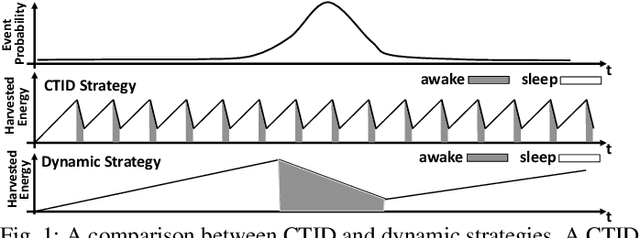
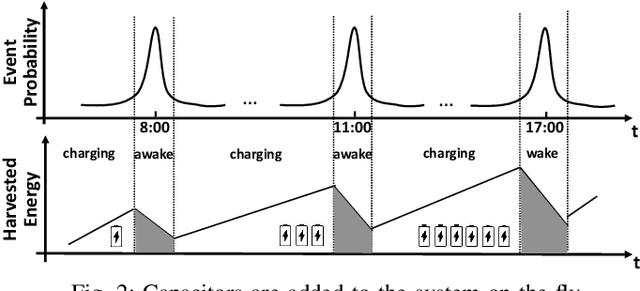


Abstract:We propose SmartON, a batteryless system that learns to wake up proactively at the right moment in order to detect events of interest. It does so by adapting the duty cycle to match the distribution of event arrival times under the constraints of harvested energy. While existing energy harvesting systems either wake up periodically at a fixed rate to sense and process the data, or wake up only in accordance with the availability of the energy source, SmartON employs a three-phase learning framework to learn the energy harvesting pattern as well as the pattern of events at run-time, and uses that knowledge to wake itself up when events are most likely to occur. The three-phase learning framework enables rapid adaptation to environmental changes in both short and long terms. Being able to remain asleep more often than a CTID (charging-then-immediate-discharging) wake-up system and adapt to the event pattern, SmartON is able to reduce energy waste, increase energy efficiency, and capture more events. To realize SmartON we have developed a dedicated hardware platform whose power management module activates capacitors on-the-fly to dynamically increase its storage capacitance. We conduct both simulation-driven and real-system experiments to demonstrate that SmartON captures 1X--7X more events and is 8X--17X more energy-efficient than a CTID system.
Zygarde: Time-Sensitive On-Device Deep Intelligence on Intermittently-Powered Systems
May 05, 2019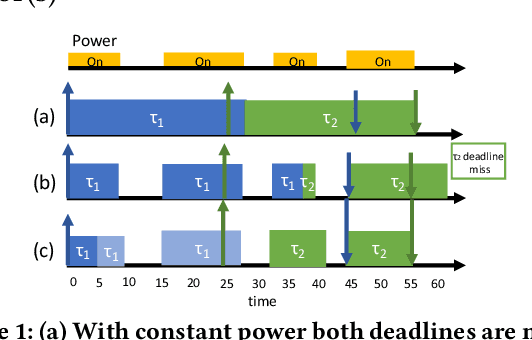
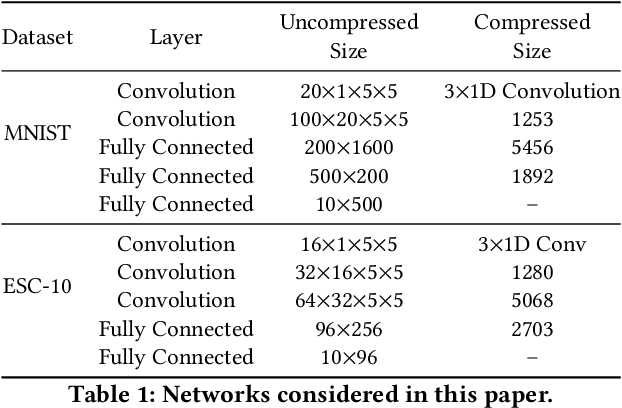
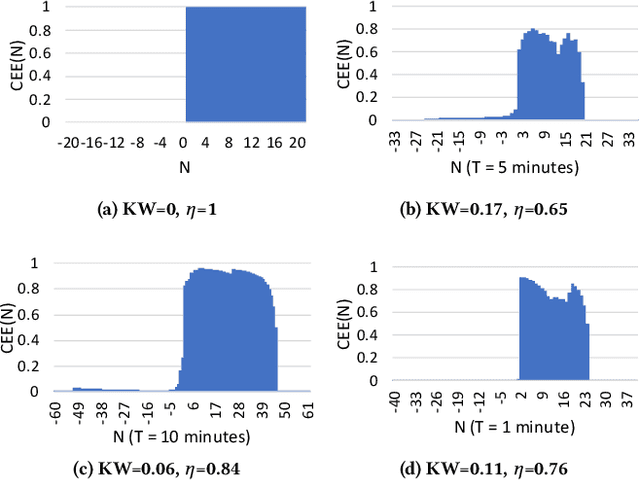
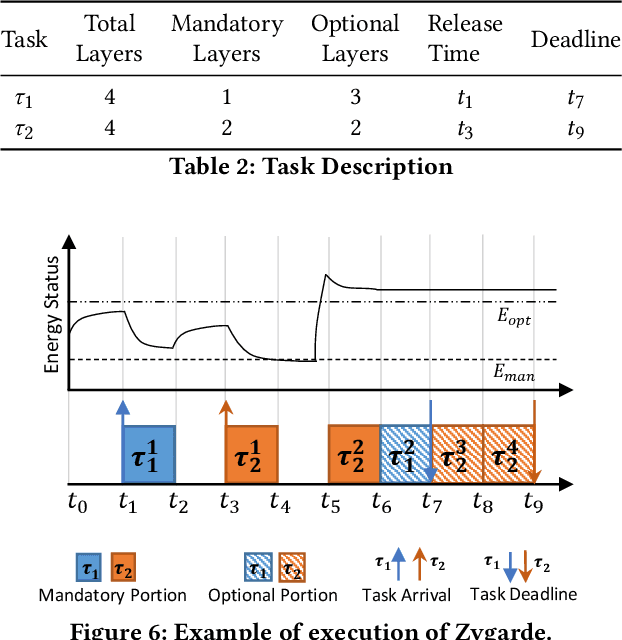
Abstract:In this paper, we propose a time-, energy-, and accuracy-aware scheduling algorithm for intermittently powered systems that execute compressed deep learning tasks that are suitable for MCUs and are powered solely by harvested energy. The sporadic nature of harvested energy, resource constraints of the embedded platform, and the computational demand of deep neural networks (even though compressed) pose a unique and challenging real-time scheduling problem for which no solutions have been proposed in the literature. We empirically study the problem and model the energy harvesting pattern as well as the trade-off between the accuracy and execution of a deep neural network. We develop an imprecise computing-based scheduling algorithm that improves the schedulability of deep learning tasks on intermittently powered systems. We also utilize the dependency of the computational need of data samples for deep learning models and propose early termination of deep neural networks. We further propose a semi-supervised machine learning model that exploits the deep features and contributes in determining the imprecise partition of a task. We implement our proposed algorithms on two different datasets and real-life scenarios and show that it increases the accuracy by 9.45% - 3.19%, decreases the execution time by 14\% and successfully schedules 33%-12% more tasks.
Intermittent Learning: On-Device Machine Learning on Intermittently Powered System
Apr 21, 2019
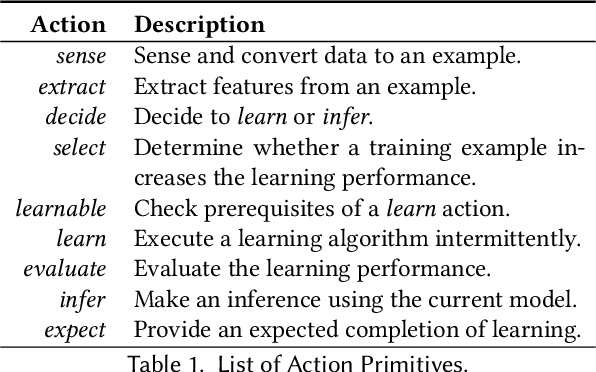
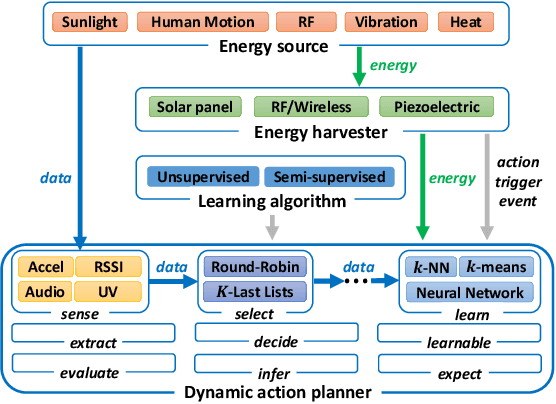
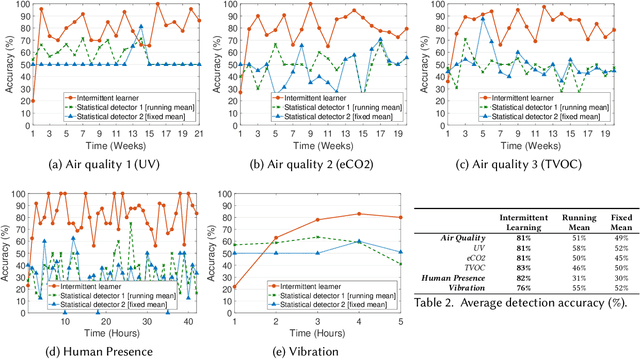
Abstract:In this paper, we introduce the concept of intermittent learning, which enables energy harvested computing platforms to execute certain classes of machine learning tasks. We identify unique challenges to intermittent learning relating to the data and application semantics of machine learning tasks. To address these challenges, we devise an algorithm that determines a sequence of actions to achieve the desired learning objective under tight energy constraints. We further increase the energy efficiency of the system by proposing three heuristics that help an intermittent learner decide whether to learn or discard training examples at run-time. In order to provide a probabilistic bound on the completion of a learning task, we perform an energy event-based analysis that helps us analyze intermittent learning systems where the uncertainty lies in both energy and training example generation. We implement and evaluate three intermittent learning applications that learn the air quality, human presence, and vibration using solar, RF, and kinetic energy harvesters, respectively. We demonstrate that the proposed framework improves the energy efficiency of a learner by up to 100% and cuts down the number of learning examples by up to 50% when compared to state-of-the-art intermittent computing systems without our framework.
 Add to Chrome
Add to Chrome Add to Firefox
Add to Firefox Add to Edge
Add to Edge